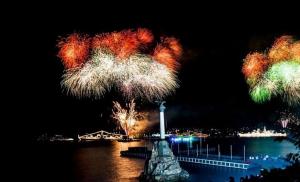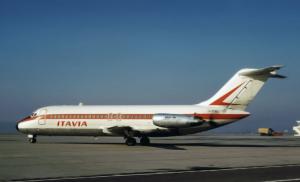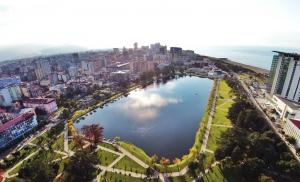Russian luxury sellers are betting on tourists from China. Express line How Chinese tourists differ from others
When you think of travelers from China, do you imagine a large group of people on a tour bus with cameras and video cameras at the ready? If so, it's time to change the way we think about some of the world's largest and most economically important travelers.
Since the number of Chinese travelers traveling outside their home country is increasing significantly every year, it is worth paying special attention to the specifics of working with them. Let's highlight 5 different archetypes of tourists from the Middle Kingdom. Let's divide Chinese tourists into groups depending on their habits and behavior and make sure that the number of independent and ambitious travelers from China under 35 years of age has increased significantly.
1. Researchers. 25% of tourists.
Born in the 60s - 70s. They are inventive and optimistic, love to learn and explore, and plan their trip to the smallest detail.
2. Prudent family men. 25% of tourists.
Also born in the 60s - 70s. These travelers come from cities with a lower standard of living, are family people and prefer to relax with family and friends. They choose safe family hotels.
3. Lovers of comfort. 21% of tourists.
The vast majority of representatives of this type were born in the 90s. Unlike other groups, there are more women among them. They want everything around them to be aesthetically beautiful, and, as a rule, they try to find intangible satisfaction in travel. Good value for money is essential for this archetype.
4. Seekers of new experiences. 17% of tourists.
As a rule, they were born in the 80s and 90s and come from cities with a high standard of living. They enjoy luxury hotels and professional advice on local cultural events. Being independent and ambitious, they travel to gain new experiences.
5. Spoiled by position. 12% of tourists.
Born in the 80s, they travel to pamper themselves and demonstrate power and status to others. Most often they stay in five-star hotels and go on tours that involve risk.

According to Ipsos, a global leader in market research, Chinese youth spend 27% of their total income on travel, making them the most promising group. “The idea that Chinese guests only want Chinese breakfasts and require a Chinese translator is outdated. Our research shows that today's Chinese traveler is much more sophisticated,” says Abiram Chaudhry, vice president and managing director of Hotels.com Asia Pacific.
In 2015, Chinese travelers on average reduced their daily spending by 17% compared to 2014. This appears to be due to the downturn in the economy. Despite this, one third of those surveyed plan to spend more money on travel next year.
Chinese tourists spend an average of about 3,455 USD per year on travel, which is the largest figure in the world. Young people spend 27% of their total income on travel.
At the same time, the Chinese still spend the most on trips in the world (on average about 3,455 USD per year). Excluding living expenses, Chinese travelers spend most of their money on shopping, restaurants and attractions.
One of the main requirements of Chinese travelers for a hotel is the availability of a free WI-FI network. Currently, 45% of hotels surveyed already provide free Wi-Fi, and another 46% plan to provide it soon.
Having Chinese speaking staff is no longer an important service for the Chinese. There is also an increase in the share social networks(6%) as a source of information for travelers.
Thank you for your help in preparing this material for Hotels.com. 


Smokers asked, experts answered
Just like Chinese New Year On the “Smoking Room” forum of the TourDom.ru portal, in the “Help Out” section, a thread appeared with almost 40 posts about how to start making money by hosting tourists from China.
“Maybe someone can tell me how to get into this vast market, i.e. addresses, passwords, sender appearances, smart thoughts, etc.,” asks the initiator of the discussion, a forum regular under the nickname Pofigist. “Can I also write in a personal message?” – echoes the user LION.
The reason for this conversation was the recent news that the flow of guests from the Middle Kingdom is breaking all records: in the first 9 months of 2015, 395 thousand people visited Moscow as part of tourist groups, which is more than two times more than in the entire 2014.
The first step is to hire a Chinese
According to preliminary estimates, Chinese travelers spent Russian capital from 800 million to 1 billion dollars. So the active interest of “smokers” in this topic is quite logical. And, most importantly, he is very timely. Now you can still get into the incoming sphere from China. But this business in Russia is being actively developed by Chinese entrepreneurs themselves, who want to make money by hosting their compatriots. Our businessmen are clearly concerned about growing competition. Soon the direction will be clearly divided and difficult to access for debutants.
So, let's return to the question of forum users: How to start? From behind-the-scenes conversations with experienced experts in the field, we can give some clues. So - in large strokes, without pretense of fundamentality.
Let's start with the fact that comrades LION and Pofigist have different profiles. The first one, obviously, represents a travel agency, i.e. he wants to make money from the reception. The second one is interested in loading the Chinese “3* hotel in picturesque place Moscow region, a 10-minute drive from the Moscow Ring Road and 1 5* hotel in the center, both with congress opportunities and experience in hosting groups, visa support and sane staff.”
Nevertheless, experts give them one piece of advice for both: as an option, hire an employee with knowledge of the language, preferably a Chinese (for example, a student at some Moscow university). To begin with, he must draw up a commercial proposal under your guidance and send it to a wide range of Chinese sending tour operators. And then let him call them - study the demand, establish contacts. Over time, this will give results in the form of the first orders. The employee’s next task is to create a website in Chinese.
And, of course, it makes sense to visit specialized stands with him at Russian tourism exhibitions, and ideally, go to forums in Beijing and Shanghai, but this depends on the budget.
Another recommendation to the prospective tour operator and hotelier: you need to get to know "A world without borders". De jure, this is an association that promotes the development of Chinese tourist flow to Russia. But there is a feeling that her powers are broader than those of public organizations. In particular, she takes part in resolving issues with visas, and somehow participates in approving the list of travel agencies that have the right to issue such invitations to groups for which a simplified visa procedure applies. Over time, it is desirable for any “new” operator to become one of them.
For a hotelier, communication with the “World Without Borders” can also, under certain conditions, advance him towards his goal, i.e., to receive orders. By the way, it is this organization that is promoting the China Friendly project - a voluntary certification system, mainly hotels undergo it.

Bottlenecks
Now - information separately for LION (personal message to the Pofigist hotelier will be below).
Becoming one of the companies authorized to provide visa support to Chinese group tourists will take time. Perhaps more than one year. Therefore, at first, newcomers find a tour operator already on this list of selected ones and act through him. The service costs about $10 per “surname.”
We won’t even touch on the food topic, because it is vast. How and how to stand out from the numerous tour operators offering tours around Russia for Chinese guests?.. This is something everyone decides for themselves.
We will only note a number of difficulties that we will definitely encounter.
If you find a large client supplier from China, he will demand that you give him credit. Payment a month and a half after arrival is normal practice for companies of this format. And these, of course, are risks. And it will require significant working capital, which most market participants are currently struggling with.
As for small Chinese firms, rest assured that they will soon try to open their own reception in Russia. They will work for a season or two, then send their emissaries to Moscow and St. Petersburg to negotiate directly with hotels, transport companies, etc.
Further. There is a shortage of tour guides with knowledge of Chinese. There are literally all of them, there are 96 such specialists in Moscow, about 400 in St. Petersburg. They charge $100–150 per working day. Customers always want to reduce this cost item and attract the same Chinese students to serve the groups, who can be paid half as much. But this, as you understand, is illegal, you have to somehow get out of it at the exhibition sites... For example, in St. Petersburg, groups with illegal guides are clearly caught in any museum, local sinologists are a united people, they defend their interests with the whole world. Somewhere in Moscow they may turn a blind eye. But the topic is still painful. We don’t want to let foreigners into these jobs; there aren’t enough of our own, and for now it’s a clinch. In general, a separate topic.
Personally I don't care
Let's add a few words - for a hotelier who wants to host Chinese guests.
The first thing, naturally, you will want to contact local tour operators of this profile, potential suppliers of clientele. Among the most famous are, of course, such inking specialists as, "Tari Tour". We also hear about companies that historically send Russians to China and, accordingly, have a good return flow of clients - among them, for example, "Express Line". Also known in this area "Kalina Travel", "Tumlar" and others. But, perhaps, not such venerable partners, but also beginners, are more suitable for you - in general, look and you will find.
Now, very briefly about how to create a more or less comfortable environment for Chinese clients in a Russian hotel. We need someone at the reception who speaks Chinese. The hotel navigation system is in Chinese. ATMs and terminals with a Chinese interface to use cards issued, respectively, in China and supported by the payment system of this country.
Next, be sure to have free wi-fi. Access to hot drinking water: cooler in the hall, kettles in the rooms, you can’t live without them. Regardless of the level of the hotel, slippers will be needed in the rooms; in China they are available everywhere. Well, sockets with Chinese connectors are also very desirable, because clients need to charge their devices.
A separate topic is nutrition. Chinese food should be offered for breakfast, otherwise guests will definitely be dissatisfied with the service, which will be written about in reviews on the relevant resources.
Groups should be placed as compactly as possible, on one floor. Having arrived in a country with a completely different culture, they prefer to stick together, especially since they feel the language barrier acutely. And one more thing: numerology is important for them, familiarize yourself with the basics of this eastern wisdom, it will make life easier for everyone. Well, the simplest things: for example, the number 4 for the natives of the Celestial Empire means “death”, symbolized by the same hieroglyph. Accordingly, they cannot be placed on the fourth floor, in the fourth room, etc.
That's all for now.
But we will definitely continue the Chinese theme. The next publication contains a verbal portrait of a Chinese tourist. It will be useful to everyone who is in one way or another determined to make money in this area.
P.S.: By the way, Happy Year of the Red Fire Monkey to you, dear Pofigist, LION and other readers!
The editors express gratitude for their assistance in preparing the article to the Tari Tour company, the World Without Borders association, and the Department of National Policy, Interregional Relations and Tourism of Moscow.
Moscow - a city that attracts many tourists, including Chinese tourists. Therefore, in the capital we organize excursions in Chinese.
Our guides - These are licensed professional guides in Chinese with many years of experience in the tourism industry. Our guides not only have an excellent command of the Chinese language and knowledge of the history and culture of the city, but also know all the intricacies of communicating with tourists and guests from China.
Excursions for Chinese tourists in Moscow include an interesting story from a guide who will reveal the secrets of our city and talk about the features of the architecture of past times.
Chinese tourists will be able to appreciate the beautiful monuments, the magnificent historical part of the great city.
For a more detailed sightseeing, you can make individual route, allowing you to cover all interesting historical and significant, popular among tourists, modern places.
By ordering a tour in Chinese you receive
1. A clearly planned excursion program adapted for the Chinese tourist.
2. High-quality transport service, punctuality and courtesy of the driver and guide.
3. The optimal route for visiting attractions, visiting museums without queues.
4. Convenient way payment.
Excursions for Chinese tourists in Moscow.
|
Moscow...  Chinese tourist on Red Square |
Excursion. ★★★ An excursion accompanied by a professional guide in Chinese is a unique opportunity to get to know the capital in all its beauty and diversity, enjoy the city landscapes, and learn many interesting historical facts, and fall in love with this city forever! ★★★ We will drive along the famous embankments and streets historical city: Boulevard and Garden Rings, Kutuzovsky Prospekt; you will see the Bolshoi Theater and the Manezh, Stalin's skyscrapers, the Arc de Triomphe, the golden domes of the Cathedral of Christ the Savior, the swan pond near the walls Novodevichy Convent, Sparrow Hills, Moscow State University building, Luzhniki stadium. ★★★ At the end of the sightseeing tour, you will walk along the famous paving stones of Red Square, see the multi-colored domes of St. Basil's Cathedral, and enjoy the splendor of the panorama of the ancient Kremlin from the Sofia embankment of the Moscow River. The duration of the excursion is 4-5 hours. |
|
"Lights of Moscow" for Chinese tourists. ★★★ Excursion accompanied by a professional guide in Chinese – you will plunge into a sea of luminous lights and learn all the secrets of the night capital ★★★ On the excursion you will see St. Basil's Cathedral, admire the view of the Kremlin from Sophia Embankment, the panorama of Moscow from the Sparrow Hills, visit the Cathedral of Christ the Savior, the Novodevichy Convent, Poklonnaya Hill, New Arbat, Tverskoy Boulevard, Theater Square. ★★★ We will start our tour of Moscow at night from the central part of the city, drive along the beautifully illuminated Garden Ring, and also look at all the main attractions of our beloved capital. The duration of the excursion is 3 hours. |
|
|
Tour of Red Square for Chinese tourists Excursion around the Kremlin territory for Chinese tourists Excursion around the Kremlin territory for Chinese tourists |
for Chinese tourists. ★★★ The heart of Moscow, the main square of the city, stretching along the north-eastern wall of the Kremlin. Mausoleum, Place of Execution, St. Basil's Cathedral, Kazan Cathedral, Historical Museum and other attractions make it the place where all guests of the capital first go. ★★★ We will start our walk from Manezhnaya Square, we will see a modern hotel, which was once the Soviet Hotel “Moscow” and was built under Stalin, we will look at the Manege building, which was built by the outstanding architect Osip Bove, the famous creator of the Bolshoi Theater. Let's go into the Alexander Garden, see the main Eternal Flame, which is guarded by soldiers of the Preobrazhensky Regiment and learn that there are actually three gardens there. And, of course, we will visit Red Square itself with all its main attractions. The duration of the excursion is 2-3 hours. |
Cost of sightseeing tour for Chinese tourist groups.
Price in rubles (₽) per person
| Excursion | Group |
Plus commission. |
||||||
| 4+1 | 15+1 | 20+1 | 30+1 | 40+1 | ||||
|
Excursion. Sightseeing tour “Moscow is the capital of Russia” |
3500₽ | 1400₽ | 1300₽ | 1200₽ | 1150₽ | 3000 ₽ | ||
| Excursion around evening and night Moscow "Lights Moscow" | 4500₽ | 950 RUR | 750 RUR | 550 ₽ | 450 ₽ | 4000 ₽ | ||
| Excursion around the Kremlin territory and Red Square | 1750₽ | 1500₽ | 1500₽ | 1500₽ | 1500₽ | 3000 ₽ | ||
| Attention! |
Call! You can always agree! ☎ +7 905 280 20 70 |
I work for a company that receives Chinese delegations in Russia. Usually these are both government-level delegations and ordinary tourist groups.
Having counted 500 Chinese who visited Russia in a week, whom I was coordinating, and from whom my phone was shaking every minute, I decided that it was time to write an essay about Chinese tourists, especially since I have to work closely with them and often replace the guide myself. losers and would-be translators.)
1. Mass character
The Chinese are traveling to Russia in large groups. Usually 30-40 people. Managing such a crowd is not easy, as they often scatter and get lost. That year, we spent several hours looking for a missing Chinese man on Red Square, and eventually found him near the monument to Marshal Zhukov. I had to ask fifty Chinese if they were lost :) For convenience, each group usually has its own flag and caps or T-shirts.
2.The tour guide, as the leader of the group, is cunning and merciless
An unmanageable group of Chinese tourists is usually managed by a tour guide - a person who resolves all issues regarding ground handling in Russia and serves as a kind of intermediary between the Russians and the Chinese. The profession is difficult and the personalities of tour guides are usually appropriate. Typically, tour guides are famous for the fact that they like to complain to their superiors about the shortcomings of reception in Russia: both guides who lead excursions and drivers with hoteliers fall under the scope. It's rare that tour leaders like everything. Usually these are cunning Chinese in the nature of small traders who take profits from the shops where they bring tourists, from guides who supply groups and tickets to entertainment places. Tour guides usually skillfully shift their mistakes onto others, not disdaining moral principles.
3. Accommodation of several people
Usually the Chinese settle in groups of several people. Only the big boss is accommodated one at a time; he is always given the largest and most expensive room.
In an effort to save money, the Chinese can add several extra beds, even when there are no places at all. Recently I organized a reception for business groups in Yekaterinburg at the large industrial exhibition Innoprom. Several important Chinese did not have enough space, they solved the problem by sleeping two on one bed, and nothing was done.
4.Hotels - the pursuit of simplicity.
Requirements for hotels are growing every year.
Hoteliers, in turn, are bowing down to the Chinese, but still cannot provide high-level service.
Usually the Chinese prefer inexpensive 3-4* hotels. A big plus is the presence of a Chinese restaurant in the hotel.
The Chinese love to be indignant when there are no kettles or boilers with hot water in the room, since they drink it in large quantities and brew noodles in it, which they bring with them to Russia. Special requirements usually include rice for breakfast, the presence of chopsticks in restaurants, air conditioning, slippers and a bathrobe.
5.Love for native food
Chinese tourists, while in a foreign land, still prefer Chinese restaurants. Obviously, local restaurants with food that is not Chinese at all. There are often complaints about the service, lack of sanitary standards and tasteless food. Chinese restaurants that receive large traffic are really no different high quality cooking. Usually lunch and dinner for a Chinese tourist costs about $8-10. Waiters and staff usually do not speak Russian, so you need to communicate with them in Chinese. Recently, by the way, the Chinese have unexpectedly fallen in love with the MUMU cafe. We took them there several times and word of mouth brought popularity to this cafe. The Chinese like meat, noodles, and all types of kebabs. They rarely choose sweets and fruits. Alcoholic drinks are usually beer. 
6. Guides are experts in history
Guides for Chinese tourists are a different matter. Typically, the Chinese prefer to order the services of guides originally from China to visit Russian attractions.
Russian licensed guides, who are produced by a special association, according to the tourists themselves, are “not understood” due to the complexity of the spoken Chinese language.
As a rule, the history of Russia in the mouths of Chinese guides is very specific and alternative. So once, when asked what kind of monument was Yuri Dolgoruky on a horse, a Chinese guide answered without blinking: “This is Lenin on a horse.” The high-rise building on Kotelnicheskaya embankment is called Moscow State University, and the Lavra was built by the Chinese) The guides are usually students and graduate students from China. The income from such work is quite good - from 90 dollars a day plus tips. You can earn up to $200 per day.
7. Moscow-Peter-Baikal
Favorite cities to visit for the Chinese are Moscow, St. Petersburg, and Sochi. Sometimes Kazan and Novosibirsk are included in the list.
Baikal is especially loved, where the Chinese spend 7-10 days. River cruises from Moscow and St. Petersburg are sometimes popular. Peter attracts with his European style, Moscow is not that interesting, except maybe the capital. Sochi- Olympic venues. Of course, the Chinese from the North visit Far East: Khabarovsk and Vladivostok.

8. Lack of interest in Orthodoxy
Despite all the government's plans to attract interest in Orthodox churches, the Chinese do not experience this interest. Usually they go to the Lavra or Suzdal to look at ancient temples, without delving into the details. 
9.Love of shopping.
The Chinese in Russia are avid shopaholics. They usually buy branded items, military clothing, amber (which, according to Chinese beliefs, cures diseases), chocolate and vodka.
Once, when I was working as a guide, we spent several hours buying army combat boots for a big Chinese boss. All the other low-level bosses simply tolerated it in silence, and I also had to suggest which style was better. There are also unpleasant stories when the Chinese buy fake amber and then sue or buy tiger skins with which they are wrapped at the border. 
10.Chinese pensioners, cheerful and lively.
A separate chapter is about Chinese pensioners, who make up the main contingent of groups in Russia.
They are lively and cheerful, they are active and cheerful. They don't get tired.
Recently, my 95-year-old grandfather came to visit us, and I was very worried that it would be difficult for him. And my grandfather broke all stereotypes by standing in an hour-long line at the mausoleum to see the leader of the world proletariat.
Another Chinese grandmother became seriously ill in St. Petersburg, the disease threatened to completely numb the body. Everyone was very worried about her health, but the next day the grandmother jumped up and ran to the Hermitage, scattering all the doctors. 
11. Love for military themes
As mentioned above, Russia is shrouded in a haze of militarism in the eyes of Chinese tourists.
In addition to their love for military clothing and paraphernalia, Chinese with higher incomes go to Russia to ride tanks, shoot and taste army food.
The pleasure is not cheap, but apparently Russian militants played a positive role in shaping the image of Russia.

And yet:
Chinese tourists, despite their complex habits that are not easy to understand, are often very friendly and nice. You just need to find an approach to them)




















